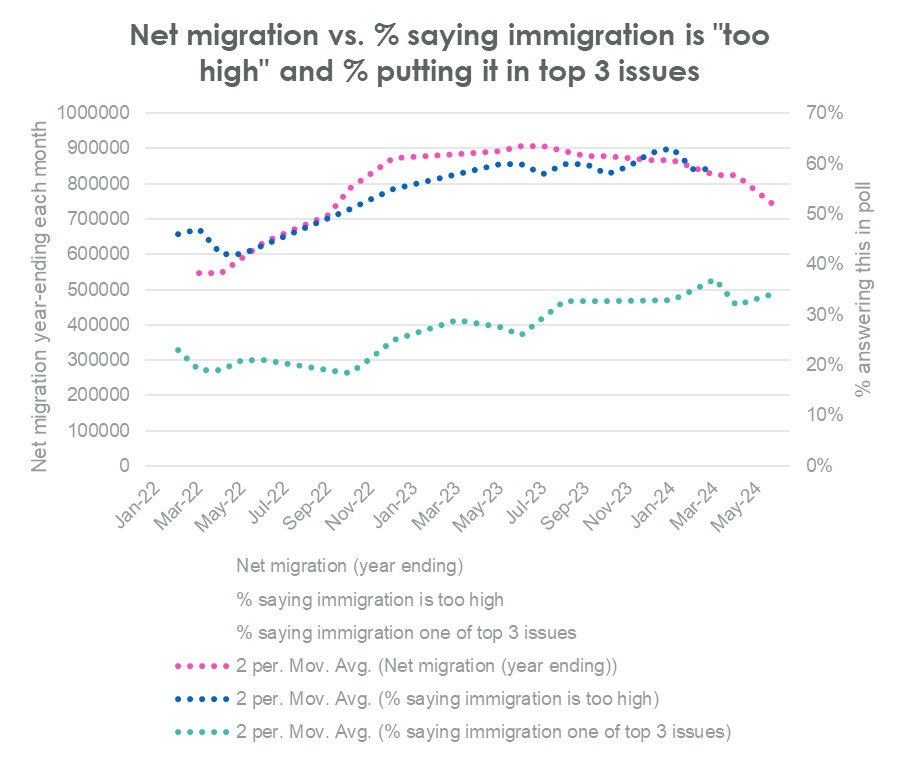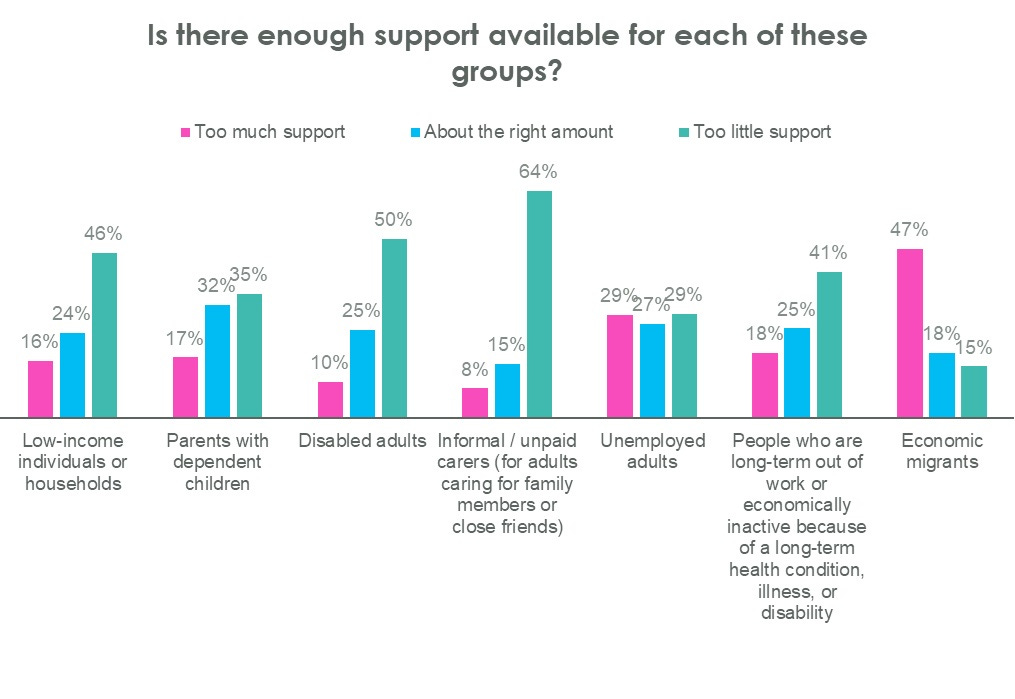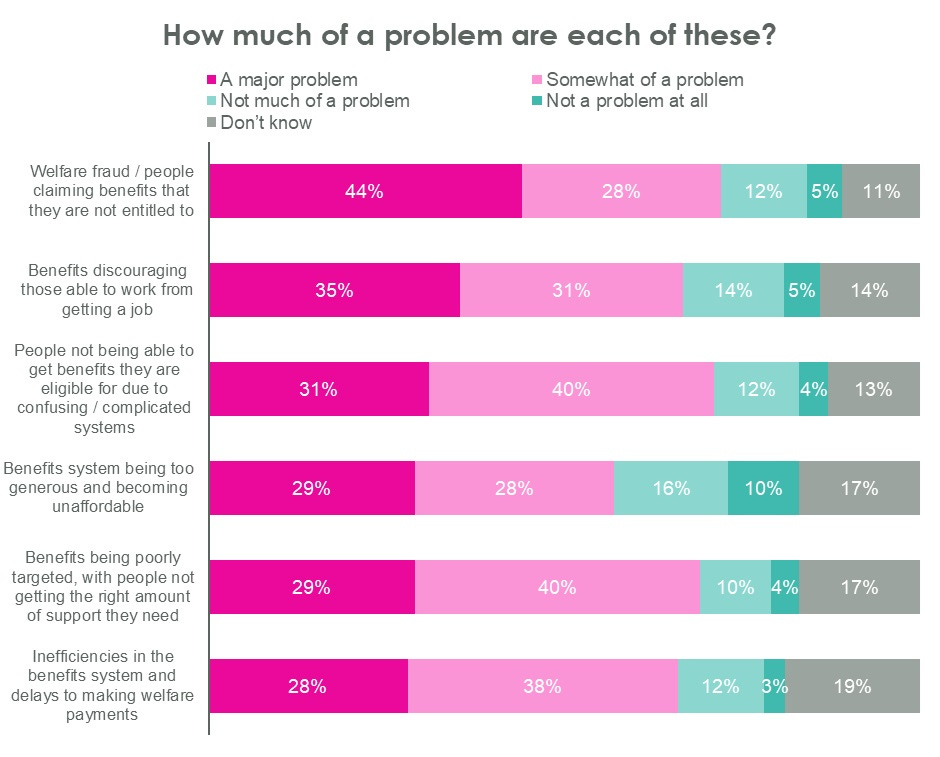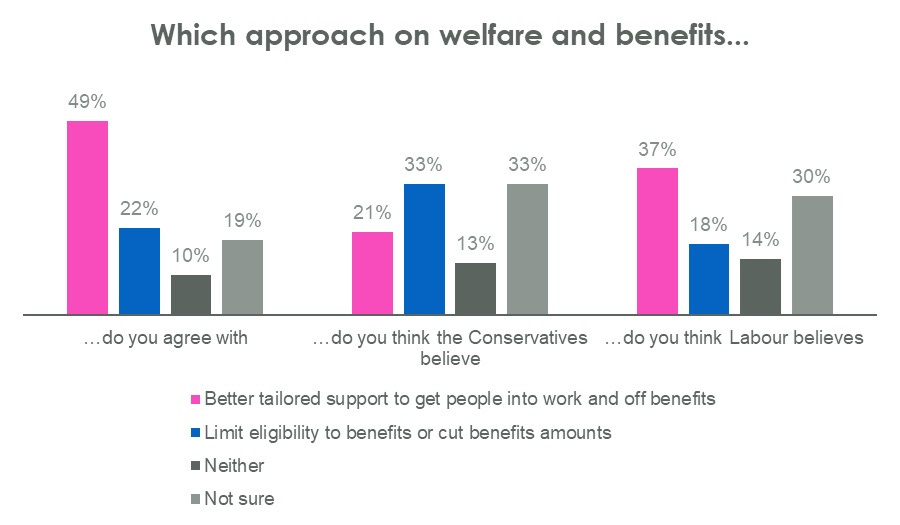Is public opinion ready for a change in approach on welfare?

Adam Drummond looks at the public’s surprisingly nuanced views on welfare, reflecting a balancing act between moral arguments and practical trade-offs
Published 6th December 2024
There is a group of topics that you should technically ask about with a negative-to-positive scale (e.g. is something too low, about right, or too high) but, in reality, are only ever going to analyse through a lens of “is the thing we don’t like at a bearable level or not”. It’s much more useful to ask about trade-offs.
For example, although we ask about whether immigration is too high, too low or about right, in reality hardly anyone tends to say “too low” so it’s really a question of whether “too high” is higher than the last time it was asked and how many people also select immigration as one of their top 3 issues. As the chart below shows, in all of the time we’ve been asking the question the winner is always “too high”, but the interest lies in how this rises and falls with the actual net migration figures, and how that compares to the proportion saying immigration is one of the top 3 issues facing the country:

Taxation is similar. Hardly anyone will answer that generally taxes are too low even if you get more nuanced answers looking at specific ones such as council tax or income tax vs. capital gains. For this reason, again, it’s better to look at questions combining taxes and spending to make sure people engage with trade-offs and how these change over time. This shows us things like, for example, the immediate impact of the Budget where there are some small signs of change since October with “reduce taxes and spend less on public services” rising by 6 points:

The reason for mentioning all of these is that, typically, welfare and benefits would be a similar story. The question isn’t whether people thought benefits were too generous or too stingy but how much variation there was within the “too generous” view.
So it’s therefore interesting that when we ask the question another way, we find a more nuanced picture. The chart below asks whether there is too much or too little support available to each of these groups:

The question was framed within the context of welfare and benefits so it is clear that the support in question comes from the government. The only two groups for whom “too much” is the top answer are economic migrants and unemployed adults. Ignoring for a moment the complications of migration and its financial impact, the interesting thing here is “unemployed adults”. Not only is it an outlier for being a group the public feel least generous towards, but because even then it is a mixed picture with relative parity between “too much”, “too little” and “about right”. For all other groups of people, where we describe a specific type of need, there are far more respondents saying more support should be available than saying there is enough or too much.
When we ask about a series of common benefit bugbears, we get a slightly more traditional set of results:

We’ve split these by the full scale because even though the question text implies “how big a problem is this for society in the grand scheme of things”, many if not most people will interpret it as “is it a problem that this issue exists” regardless of the scale or the impact on them. Defrauding the taxpayer of £1 million, for example, may be a rounding error in the broader scheme of public spending but it’s still morally wrong and something that provokes a fair amount of outrage. There is other data that suggests that people vastly overstate the amount of money lost to fraudulent welfare claims but this is part of a general trend of the public struggling with big numbers but I think the moral outrage point is one way to explain how more people think welfare fraud is “a major problem” than the idea of benefits discouraging people from working, or the system being too generous and unaffordable.
The main point is that nearly as many people see a lack of access to benefits as a problem as those who see benefits discouraging work as an issue. There is still a blanket “welfare fraud is bad” sentiment but there is also significant sympathy for those struggling to get the support they need.
When we follow-up one of the more ambiguous statements to ask what is meant by the “benefits being poorly targeted” point, there is a split between those saying that it’s mainly people receiving more than they need (27%) and receiving less than they need (26%).
This is the environment into which the government has announced its intention to focus on carrot rather than stick when it comes to helping people from welfare to work. Liz Kendall described Britain’s job centres as merely a “benefit administration service” and when we test the two different approaches, Labour are on the side of public opinion here:

By two to one, respondents agreed with the ‘carrot’ approach of providing support to get into work rather than the ‘stick’ approach of cutting benefits to force the same outcome. Some work commissioned by the Good Growth Foundation shows that this is conditional to a degree, when we tested some statements on welfare policy the only one to get net disagreement was the idea that someone shouldn’t have their benefits withdrawn if they turn down a job. But overall, the results show how nuanced public opinion on welfare and benefits is and that the opportunity is there for a change in approach.
Subscribe to our Substack read more about the polling we do for campaign groups
See the full table tables here.
Notes to Editor:
Opinium carried out an online survey of 2,055 UK adults aged 18+ from 27th to 29th November 2024 in partnership with The Observer. Results have been weighted to be politically and nationally representative. A majority of the fieldwork took place before the resignation of Louise Haig was announced, or the assisted dying vote took place.



